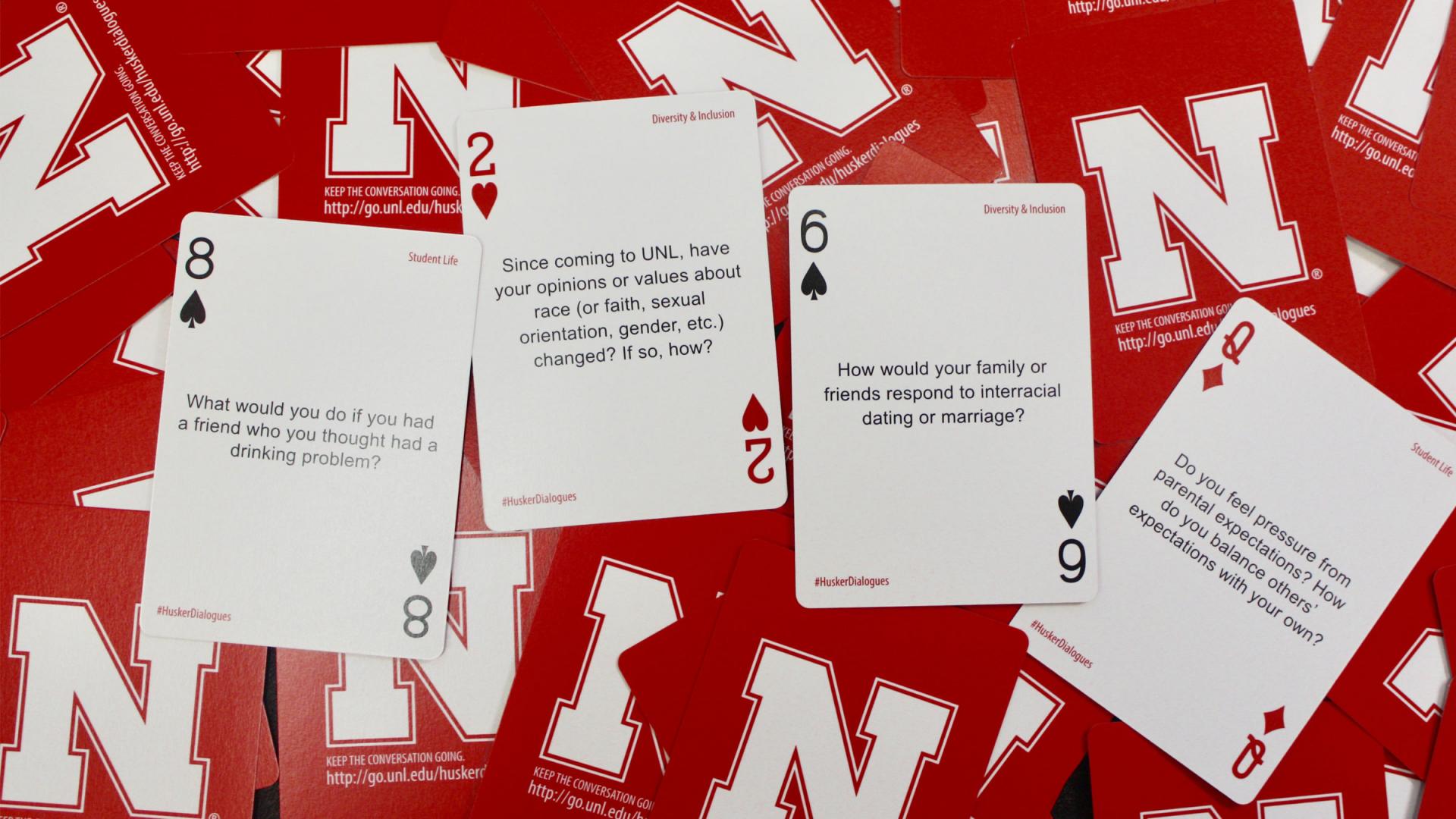Inspiring meaningful conversationshusker dialogues cards

Originally called “Dine, Dialogue & Pass It On,” the goal of Husker Dialogues cards are to develop and/or practice skills for meaningful conversations about difficult topics. Below are sample guides with activities to help facilitate conversations in a group setting using Husker Dialogues cards, a unique card deck that contains questions to inspire conversation.
- Diversity and Inclusion Guide
- Student Life Guide
Each suit in this deck pertains to a specific topic:
Clubs: alcohol and other drugs
Diamonds: personal health
Hearts: sex, gender, diversity and multicultural education
Spades: personal safety, sexual assault and legal issues
If you are uncertain which deck you are looking at, the deck name is in the top right corner of each card.
Tips for Meaningful Conversations
Use these tips to have conversations about sensitive issues.
- Listen to understand.
- Ask clarifying questions.
- Speak respectfully to express your own views.
- Use “I” statements.
- Conversations are not debates. The purpose is understanding and meaningful exchange.
- Recognize that there are multiple perspectives.
- Give everyone the opportunity to speak.
Helpful Resources
History
After a climate survey was administered in 2014-2015, the Dine, Dialogue & Pass It On (DDPIO) program developed with the goal of encouraging dialogue about race, diversity and inclusion; and helping faculty and staff develop the skills to facilitate the discussions.
Based on a lecture by Dr. Shelly Tochluk, author of Witnessing Whiteness: The Need to Talk About Race and How to Do It, the program included a specially designed deck of playing cards with questions prompting conversation on topics rarely discussed. The decks of cards inspired conversations during workshops that trained more than 500 members of the university community.
In 2015, Student Affairs made card decks available with the help of a grant from Bringing Theory to Practice. The card decks have been used by:
- Faculty and staff in the classroom and for professional development.
- Student leaders for trainings in the learning communities, student mentor programs, and in the fraternity and sorority community.
- Multicultural center programs to facilitate campus-wide conversations.
Due to the broad applications and stimulating dialogue prompted by the diversity and inclusion card deck, administrators at the University of Nebraska-Lincoln selected the tool to lead meaningful conversations among incoming students. At the Husker Dialogues event in the fall of 2016, more than 360 faculty members, staff members, and student leaders led conversations with more than 2,000 incoming Husker students. At the conclusion of the event, 87% of participants agreed they were more aware of diversity in the campus community and 84% of students felt more confident in their ability to discuss issues regarding diversity and inclusion.
Now two different decks of cards exist to promote meaningful conversations. To request a copy of either deck of cards and learn more about this resource, email studentaffairs@unl.edu.
In the News
"Husker Dialogues student speakers discuss religion, immigration, sexuality, acceptance" Daily Nebraskan, 9/7/2017
"Summer training dates added for Husker Dialogues" Nebraska Today, 7/5/2017
"Husker Dialogues seeks conversation guides" Nebraska Today, 3/13/2017
"300 volunteers sought for Husker Dialogues: New program designed to start diversity, inclusiveness talks among first-year students" Nebraska Today, 8/5/2016
"Well-Being: An Essential Outcome for Higher Education" by Ashley Finley, Change: The Magazine of Higher Learning, Vol. 48, 2016 - Issue 2
"Campus Highlights: Allies for Diversity: Creating Conditions for Student Well-Being" by Linda Major, Bringing Theory to Practice newsletter, Fall 2015
"Quilt Center hosts 'Dine, Dialogue and Pass It On'" Nebraska Today, 3/16/2015
Questions? Please contact the Office of the Vice Chancellor for Student Affairs at (402) 472-3755 or email studentaffairs@unl.edu.